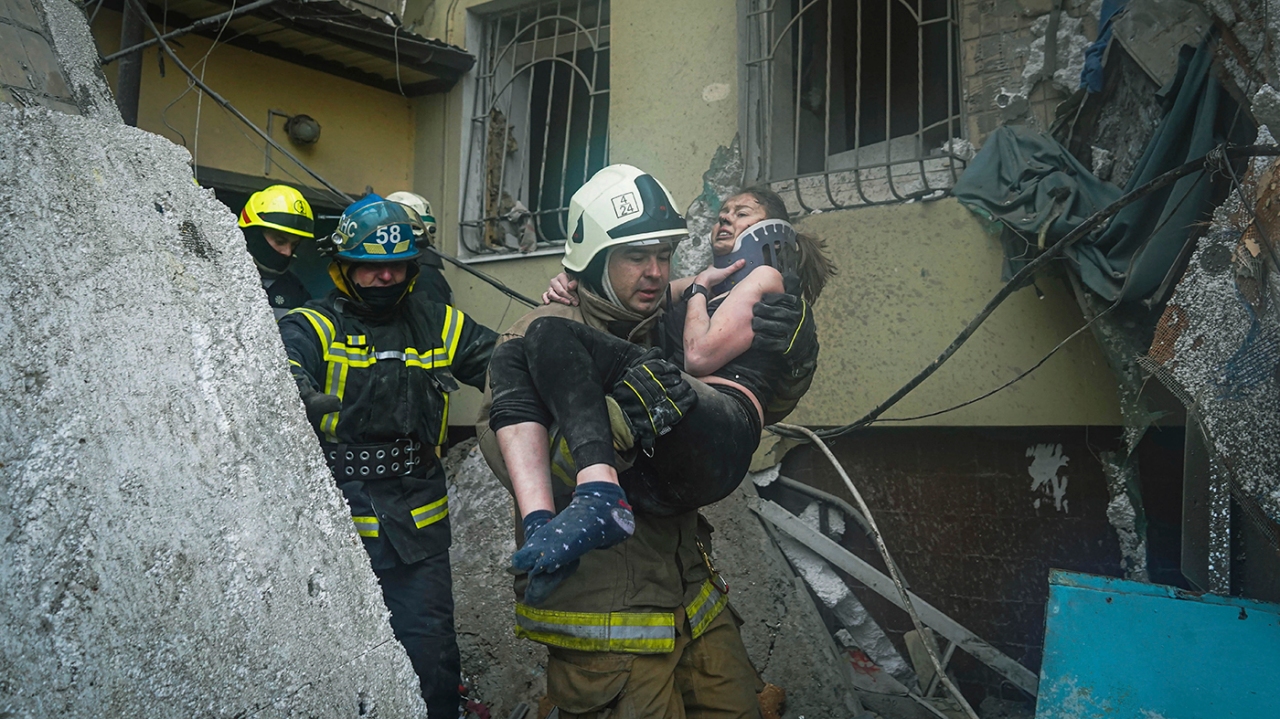A Russian missile strike over the weekend at an apartment complex in the southeastern Ukrainian city of Dnipro exposed a weakness in Ukraine’s air defenses, just as many fear more brutal Russian attacks are on the horizon.
The Dnipro strike killed 45 people, including six children, and injured another 79 people in one of the most devastating attacks on Ukraine’s civilian population since Moscow’s invasion nearly a year ago.
Russia has targeted critical infrastructure and energy grids in Ukraine with strikes since October, hoping to cow the Ukrainian people into submission after facing numerous setbacks in the war.
In the Dnipro strike, however, Ukraine says it was completely unable to stop the missile that hit the apartment complex because it lacked the defense capabilities to intercept it.
The deadly incident, just days after the Kremlin’s appointment of a new commander to oversee the war, is leading to concerns that a more desperate Russia will increasingly carry out such strikes and Ukraine will struggle to defend against them.
Gian Gentile, the associate director of the nonprofit Rand Corporation’s Arroyo Center, predicted Russia will keep up the strikes as it prepares to launch a potential ground offensive in coming months.
Gentile said he could not speak with finality on Russian intent, but he believes the Kremlin is “at the point now where they are intentionally killing civilians” to turn them against the government.
“They may be moderating between going after infrastructure and power nodes” and civilian areas, he added. ”But they are following a playbook that lots of other countries have taken in war — and that is to punish the civilian population.”
After the strike, a Kremlin spokesperson said Russia does not target residential areas and falsely attributed blame for the attack on Ukrainian air defenses, according to the Kyiv Post.
The U.K. Defense Ministry said the Dnipro strike was part of a weekend barrage of missiles targeting power grids and not a direct assault on the multistory apartment complex, noting the Kh-22 missile used in the Jan. 14 attack is “notoriously inaccurate.”
Ukrainian officials on Monday said they do not possess a defense system capable of downing Russia’s Kh-22s, a Soviet-era long-range missile designed to strike ships and aircraft. Ukraine’s Air Force Command said in a Facebook post that Russia has fired more than 210 of the missiles since the war began and Ukraine has shot down none of them.
According to analysts, Kyiv is physically capable of shooting the missiles down, but they are extremely hard to track. The Kh-22 can reach more than 3,000 mph once fired from Russia’s Tu-22M3 bomber planes.
The missile type, equipped with a conventional warhead, has been used in past strikes, including one on a shopping mall in the city of Kremenchuk in June that killed around 20 people.
Yuriy Sak, an adviser to Ukraine’s defense secretary, said Kyiv needs the Patriot missile defense system or a SAMP-T, a defense system co-owned by France and Italy, to effectively take the missiles down.
The U.S. and Germany are each providing Ukraine with one Patriot defense system, and American troops are training Ukrainian personnel on the missile system at Fort Sill in Oklahoma.
But Sak said Ukraine will undoubtedly need more of the Patriots.
“It’s a question of quantity because Ukraine is a large country,” Sak told The Hill. “To protect Ukrainian cities, we will need to continue to work with our partners to get more of these systems.”
Others cautioned that while more air defense systems were good, they can only do so much, arguing Ukraine also has to be effective in responding to the attacks.
Konstantin Sonin, a professor in the School of Public Policy at the University of Chicago, said there were indications Russia may have modified its missiles or launched the attack from an unclear direction, further stymying Ukraine.
“In this attack, the air defense was extremely unsuccessful,” he said. “I think they’re extremely busy trying to figure out how it was done.”
Russia is reportedly running low on ammunition and inventory, leading to questions regarding if the Kremlin has the ability to continue the strikes.
But Sak said Russia is continuing to produce more missiles, and with its existing stockpile, the Kremlin could “at any given moment” conduct two or three mass strikes.
That evidence is also supported by other analysts, who estimate Russia could continue the attacks with the current munitions supply through at least the summer.
The Dnipro attack led to an outpouring of grief from Ukraine, even in a country already beleaguered by war and death.
Noting the sheer number of civilian deaths, Ukrainian President Volodymyr Zelensky said in a Monday evening address that Ukraine is “doing everything to strengthen our air defense as much as possible.”
“What happened in Dnipro, the fact that Russia is preparing a new attempt to seize the initiative in the war, the fact that the nature of hostilities at the front requires new decisions in the defense supply,” he said, “all this only emphasizes how important it is to coordinate our efforts — efforts of all members of the coalition to defend Ukraine and freedom.”
Author Profile
- "Center" Bias Rating
- The Hill is an American newspaper and digital media company based in Washington, D.C. that was founded in 1994. Focusing on politics, policy, business and international relations, The Hill's coverage includes the U.S. Congress, the presidency and executive branch, and election campaigns.
Latest entries
 HeadlinesOctober 22, 2023'Calculated misery': Here's why airlines want you to be uncomfortable
HeadlinesOctober 22, 2023'Calculated misery': Here's why airlines want you to be uncomfortable HeadlinesOctober 19, 2023Pressley, Booker Reintroduce MOMMIES Act to address maternal health disparities
HeadlinesOctober 19, 2023Pressley, Booker Reintroduce MOMMIES Act to address maternal health disparities HeadlinesJune 14, 2023Jill Biden warns against Trump: 'We know what’s in store if these MAGA Republicans win'
HeadlinesJune 14, 2023Jill Biden warns against Trump: 'We know what’s in store if these MAGA Republicans win' HeadlinesJune 13, 202311 dead in Russian missile attack on Zelensky's hometown
HeadlinesJune 13, 202311 dead in Russian missile attack on Zelensky's hometown

